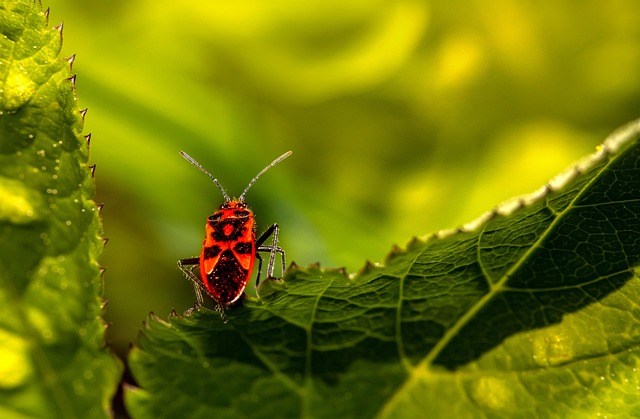Grain weevils, persistent pests causing significant economic losses in stored grains, require effective yet sustainable control services. While they disrupt ecosystems, their challenge has spurred innovation towards humane and eco-friendly solutions. These include integrated pest management (IPM) strategies like improved storage practices, biological controls targeting specific weevil stages, and natural predators. Modern methods replace traditional chemical pesticides with breathable cloth bags, pheromone traps, and proper ventilation to create an inhospitable environment for weevils while preserving grain quality. This shift aligns with the growing demand for environmentally conscious grain weevils control services, ensuring food safety and contributing to a greener agricultural landscape.
In the realm of agricultural pest management, humane and eco-conscious approaches are gaining traction, especially with grainy weevils. These tiny invaders not only damage crops but also pose environmental concerns. This article explores effective yet sustainable methods to combat grain weevils, moving beyond traditional, often harsh, control services. We delve into understanding the behavior of these pests, comparing traditional to more humane techniques, and highlighting eco-friendly solutions for grain storage. By embracing these practices, farmers can protect their harvests while preserving ecological balance.
Understanding Grain Weevils: Behavior and Impact
Grain weevils are a common pest that can cause significant damage to stored grains and other agricultural products. Understanding their behavior is crucial in implementing effective grain weevil control services. These insects are known for their ability to survive in harsh conditions, making them persistent intruders in storage facilities. They breed rapidly, often going unnoticed until an infestation is established, which can lead to substantial economic losses for farmers and food retailers.
The impact of grain weevils extends beyond financial concerns. As eco-conscious approaches gain prominence, it’s essential to recognize the environmental implications. Weevils play a role in the ecosystem by contributing to nutrient cycling in soil. However, their destructive nature in human storage systems has prompted researchers to explore humane and sustainable methods for control. This includes integrated pest management strategies that combine biological controls, improved storage practices, and minimal use of chemical pesticides.
Traditional vs. Humane Control Methods
In the battle against grain weevils, traditional methods often involve harsh chemicals and extreme measures that can be detrimental to both the environment and non-target organisms. These conventional control services may offer quick results, but they fail to address the root causes of weevil infestations and can lead to resistance over time. As such, many professionals are now turning towards more humane and eco-conscious alternatives.
Humane grain weevil control focuses on prevention and integrated pest management (IPM) strategies. This involves creating an unappealing environment for weevils through proper storage practices, regular cleaning, and the use of physical barriers. Biological control agents like certain fungi or parasites can also be introduced to target specific life stages of the weevils without causing broader ecological disruptions. These methods not only minimize harm but also promote long-term sustainability in agricultural systems.
Eco-Friendly Solutions for Effective Grain Weevil Management
In the pursuit of humane and eco-conscious grain weevil management, there are several innovative solutions that offer both effectiveness and sustainability. Traditional chemical pesticides often come with detrimental side effects on both the environment and non-target organisms. As a result, many experts and farmers are turning to organic methods for grain weevil control services. These include the integration of natural predators such as ants and nematodes, which can help keep weevil populations in check without causing harm to ecosystems.
Additionally, physical barriers like breathable cloth bags and proper storage practices can significantly reduce weevil infiltration. Enhanced monitoring systems using pheromone traps also provide an early warning for weevil activity, allowing for timely interventions. These eco-friendly solutions not only ensure the safety of food grains but also contribute to a greener and more sustainable agricultural landscape, aligning with the growing demand for environmentally conscious grain weevil management strategies.
Implementing Sustainable Practices in Grain Storage
Implementing sustainable practices in grain storage is a multi-faceted approach to effective grain weevils control services. Beyond traditional chemical treatments, integrating eco-conscious methods can significantly reduce environmental impact and promote long-term viability. Techniques such as proper ventilation, moisture management, and temperature regulation create an inhospitable environment for weevils while preserving the quality of the grain.
These practices often involve utilizing natural predators and traps, along with organic repellents, to manage weevil populations. For instance, introducing beneficial insects like beetle larvae can naturally consume the pests. Additionally, physical barriers like silk or jute bags can protect grains during storage. Adopting these sustainable methods not only minimizes the use of chemical pesticides but also ensures the safety and potency of stored crops for both human consumption and animal feed.
In light of the above, it’s clear that managing grain weevils requires a thoughtful, balanced approach. By understanding these pests’ behavior and impact, we can move away from traditional, potentially harmful methods. Eco-friendly solutions offer an effective and humane way to control grain weevils, while implementing sustainable storage practices ensures long-term protection for crops. When it comes to grain weevil control services, embracing these innovative, eco-conscious strategies is not just beneficial for farmers but also for the environment.
